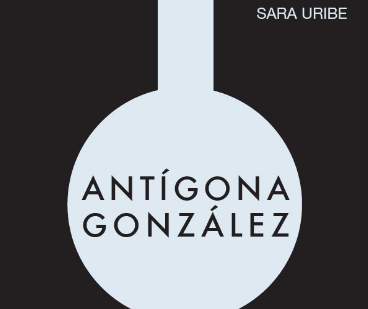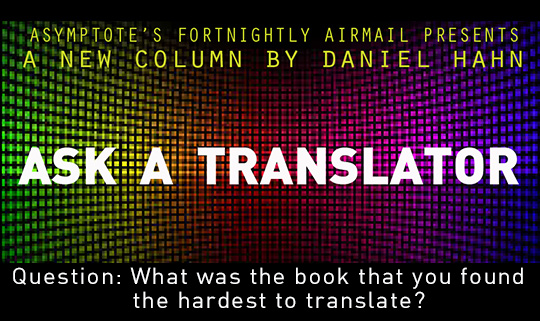Happy Friday, Asymptote pals! This week may not be “prize season” per se, but literary prizes abound this and every week, as usual. The United Kingdom‘s former Orange Prize for Fiction—then the Bailey’s Prize—and now titled the “Bailey’s Women’s Prize for Fiction”—has been awarded to The Glorious Heresies by Lisa McInerney. In France, the Prix du Livre Inter has been awarded to Tristan Garcia for his 500-page novel, 7 (fitting: the shortlist was seven titles long). And the British Commonwealth Short Story Prize (judged by Man-Booker-award-winner Marlon James) was awarded to Indian writer Parashar Kulkani, for the short story “Cow and Company.” Finally, Akhil Sharma beat out 160 other contenders to win the International Dublin Literary Award for his novel, A Family Life. READ MORE…
Monthly Archives: June 2016
Weekly News Roundup, 10 June 2016: It’s Always Prize Season

This week's literary highlights from across the world
Podcast: Play in new window | Download
Subscribe: iTunes | Android | RSS
In this month’s episode we look at science fiction from all over the world. We’ll start with the Hugo awards, the Oscars of science fiction, where a group calling themselves the Rabid Puppies is trying to take over the ceremony to protest diversity in science fiction which they see as destroying the genre. To prove them wrong, we’ll look at fantastic works from America, Russia, Cuba, and Nigeria that tell stories about dreaming robots, alien plagues, time travel, monstrous sea creatures, and the perils of extra terrestrial communication. This is the Asymptote podcast.
Editor: Mirza Puric
Voice Actors: Piyali Syam, Alessio Frank, and Rron Karahoda.
Music: Spare by Ono, Gotta Run by Wahyas, Let it Me by Drag Sounds, I Was Born on the Wrong Day by Cate Le Bon, Mary Bumble Bee by Purling Hiss Here, Masked Laughter by Dalek, Devil Do by Holly Go Lightly.
All music provided under a Creative Commons license from freemusicarchive.com
Works read: Space Raptor Butt Invasion by Chuck Tingle, Robot Dreams by Issac Asimov, Moom by Nnedi Okparanta, Memories of the Future by Sigizmund Khrizhanovsky, The Cosmonaut by Angel Arango.
“The Neighbor” by Marie Darrieussecq

"The guitar playing and the shrieks were bad enough. But then they had a piano delivered."
The original version of “The Neighbor” was published in the author’s collection, Zoo, copyright 2006 by Editions P.O.L.
***
At the Dakota, my life was peaceful.
I had inherited the apartment from my father’s sister, along with a modest sum of money. Living at the Dakota carries with it certain obligations. When the co-op decides, for example, to renovate the basement, you’d better be able to pay your share.
Until then, I had always lived with my mother in a little village in the west of France. I was a furniture maker, I had my own workshop, and everything was going well. I’d led an idyllic childhood with my widowed mother, and I would have been satisfied to continue just as I was. My mother admired my work, above all the delicately inlaid little chests. The prospect of my leaving made her very angry. She used to hate her American sister-in-law.
But I couldn’t resist the lure of the Dakota. My aunt’s death literally changed my life. I gave up my work and crossed the Atlantic, and my main activity ever since has consisted of living at the Dakota. READ MORE…
Three Must-Reads from the Spring 2016 Issue

The blog recommends three more must-reads from Asymptote's April Issue—
Hi there, Asymptote readers! When Asymptote’s April Issue came out (nearly two whole months ago!), we recommended five slick pieces to start off your reading. The issue’s still fresh, featuring dozens of articles, poems, interviews, stories, histories, and visual art definitely worth your perusal. These’ll work to stave off translation cravings until you can get your keyboard on to the July issue—which is slated to come out in a little over a month. Let’s get started (in no particular order, of course):
- An Interview with Ha Jin, by Henry Ace Knight—recommended by Allegra Rosenbaum, blog editor
When I first read Ha Jin in high school, by no means did I appreciate his writing. It wasn’t until I was applying to university that I really started to feel the effect that Waiting had made on my life. Part of the application process in the United States is a personal essay. I wrote the first draft and felt fairly confident about it. I told my mother when she got home. She had just seen Ha Jin talk at her job. READ MORE…
Translation Tuesday: “All the Countries of the World” by Krisztina Tóth

"not that face, those hands, or youth’s sepia tint / but the body, the body, that’s all, that's it"
The poplars’ catkins, no “Crematory” sign,
then a tin roof, the stack’s angled design,
that’s it, in the yard a guy’s on his phone,
the gate’s open, hello, best leave it alone,
a man stops me: Yes? —The office? I ask,
the grandma’s yours, then, the one o’clock,
that’s good, he adds, the old lady’s just out,
you mean…I thought, but could hardly doubt,
I’ve still to confirm she’s of our nation
and so by law allowed a cremation.
I show the papers to a woman fiddling
at a screen, the passport flat, its stitching
lies open, in the room’s press like a window,
its stamps attesting: the bearer to
all the countries of the world can go. READ MORE…
In Review: Antìgona González by Sara Uribe

"Both epic poem and annotated bibliography of Latin American Antígonas, Antígona González is a work of excess and heartbreaking silence."
John Pluecker translates the epigraph (from Cristina Rivera Gazra) at the beginning of Antígona González—¿De qué se apropria el que se apropria?—as “What does the appropriator appropriate?” This apparently straightforward translation tellingly reflects the translation strategies he will deploy throughout the book.
This central question echoes a pronounced tendency in Pluecker’s translation: peopling. “The one who appropriates” becomes “the appropriator,” the agent of appropriation. Throughout this translation, subjects becoming into people from more distant Spanish syntax are an artistic and ethical point of return. “They” appears again and again in sentences without subjects, “una habitante de la frontrera” (a [female] resident of the border) becomes “a woman living on the border,” and “todos” unfailing becomes “all of us.” READ MORE…
Weekly News Roundup, 3 June 2016: Superstar Contributorstars

This week's literary highlights from across the world
Happy Friday, Asymptote!
All translation is approximate, but we don’t always like to think so. “Approximate Translation” is a performance that grapples with intelligibility, performing sections of Ouyang Jianghe’s poem Between Chinese and English. And speaking of canny approximation, the Los Angeles Review of Books‘ “Multilingual Wordsmiths” series continues with Ann Goldstein, past journal interviewee and translator of Italian fever-phenom Elena Ferrante. READ MORE…
Twenty Promenades: Mouth Eats Color in Review

"...translations can never be approached as though they were original texts—even though this is so often the case."
Translation is often asked to be a silent art, an art so subtle that the reader never even sees a ripple in the translator’s wake. The translator is asked to tread softly, to follow an arbitrary measure of “accuracy” or “faithfulness.” This is precisely why Sawako Nakayasu’s Mouth: Eats Color: Sagawa Chika Translations, Anti-translations, & Originals is so brilliant. Within these pages, Nakayasu is at once invisible and intensely present, creating not a translation that masquerades as a stand-in for the original, but rather a translation that works to create new and exciting pieces that coexist alongside the original poetry. READ MORE…
Ask a Translator with Daniel Hahn

Sorry, “certain idiosyncratic syntactical structures” is a horrible phrase. In English, at least.
Our resident translation expert, writer, and jack-of-all-trades, Daniel Hahn, is back to respond to reader questions on the fine art of translation. Today’s question comes from, once again, Romanian reader, physicist, poet, and translator Marius Surleac.
Throughout your career, what was the book that you found the hardest to translate?
I have two very different answers to this, depending on your interpretation of the question. I’ll give you one of them.
The first thing to say is that there are, of course, lots of interesting ways a book can be difficult, lots of writerly qualities to tax a translator’s re-creational skills.
A book might be, simply, hard to grasp fully in the original, hard to figure out what the hell the author is actually doing or meaning. There might be stylistic issues that don’t travel well, or at least not easily—long, nested un-English sentences, say, or effects that depend on certain idiosyncratic syntactical structures that don’t match our own. (Sorry, “certain idiosyncratic syntactical structures” is a horrible phrase. In English, at least.) There might be the distinctiveness of a voice—perhaps slangy or in a dialect—that resists recreation without feeling forced or oddly accented. There might be any number of seemingly intransigent linguistic tricks, clever wordplay, that don’t have direct equivalents in the new language and so require building entirely new acrobatic effects from scratch. There might perhaps be jokes. READ MORE…

